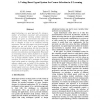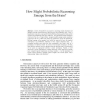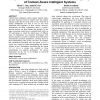35 search results - page 5 / 7 » Could the use of a knowledge-based system lead to implicit l... |
IAT
2010
IEEE
13 years 5 months ago
2010
IEEE
Agent technology is a good approach for solving a number of problems concerned with personalized learning. In personal learning contexts individual students are given an environme...
AGI
2008
13 years 9 months ago
2008
: A series of hypotheses is proposed, connecting neural structures and dynamics with the formal structures and processes of probabilistic logic. First, a hypothetical connection is...
UMUAI
2008
13 years 7 months ago
2008
Abstract. Self-efficacy is an individual's belief about her ability to perform well in a given situation. Because selfefficacious students are effective learners, endowing int...
CHI
2009
ACM
14 years 8 months ago
2009
ACM
Context-aware intelligent systems employ implicit inputs, and make decisions based on complex rules and machine learning models that are rarely clear to users. Such lack of system...
AAAI
1990
13 years 8 months ago
1990
Knowledge processing is very demanding on computer architectures. Knowledge processing generates subcomputation paths at an exponential rate. It is memory intensive and has high c...



